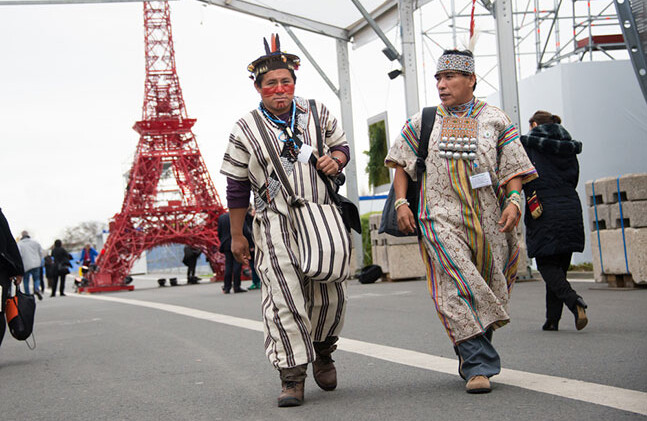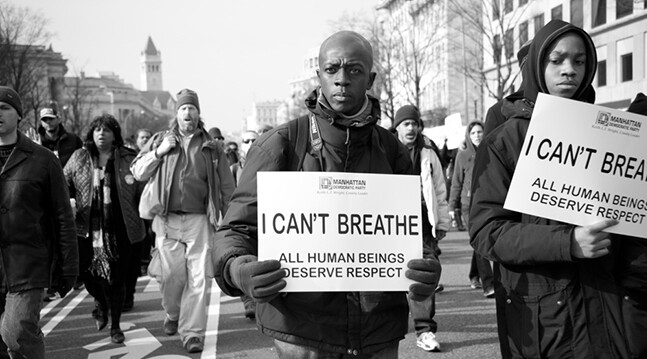...the UN Development Programme, in partnership with the International Indigenous Peoples' Forum on Climate Change (IIPFCC) is executing dialogues bringing indigenous leaders and high-level government officials together, often for the first time, to ensure that indigenous peoples' priorities and perspectives are embedded in their countries' negotiating positions for COP21. —UN Development Programme Press Release, November 11, 2015
In 2016, states will begin setting and implementing their respective goals to reduce their impact on climate change as outlined in the 2015 Paris Agreement. The Agreement itself has been greeted as "historic, durable and ambitious." The UN official in charge of the UN Framework Convention on Climate Change (UNFCCC), Christiana Figueres, announced that it has ignited "a huge flame of hope," demonstrating that climate change is a "very, very good example of how we are moving to a completely new social contract." This idea of a new social contract is one that Figueres has mentioned before, describing it as being: "enriched by the integration of North and South, East and West, and deeply informed by the interaction between global challenges and national concerns... a contract based more on collaboration than on competition... guided by the stars of solidarity and equality." These are laudable words, but in reality, one key group in the fight against climate change that arguably should be central to such a contract—Indigenous Peoples—were ignored in the final version of the Paris Agreement.
According to the UN, there are around 370 million Indigenous Peoples spread across 70 different countries, who "own, occupy or manage up to 65 percent of the Earth's land surface." The vast majority of Indigenous Peoples live in economically, politically, and/or geographically hostile environments. A study released by the International Union for the Conservation of Nature points out that Indigenous Peoples "usually occupy marginal and remote areas, such as small islands, coastal plains, mountain areas, and drylands, that are exposed to adverse environmental effects." The study goes on to point out that while Indigenous Peoples around the world have lived sustainable and adaptable lifestyles in such remote regions, the effects of climate change may exceed this adaptive capacity. Indeed, many Indigenous communities are already feeling the very real effects of a warming planet and have taken steps to mitigate this.
As a result, it is no exaggeration to say that Indigenous Peoples are the frontline defenders in the fight against the forces perpetuating climate change. Indigenous communities across the globe have made huge strides in reclaiming ancestral lands and blocking extractive and unsustainable development, at the same time advancing their right to self-determination as outlined in the UN Declaration on the Rights of Indigenous Peoples. In 2015, this meant that finally, after fighting for almost two decades, the Enxet Sur Indigenous community of Yexwase acquired "legal title to 10,030 hectares of their ancestral land in the Chaco region of Paraguay;" it meant that the Supreme Court of Hawaii "invalidated the permit allowing construction of the hugely controversial Thirty Meter Telescope atop the sacred mountain known as Mauna Kea;" it meant that after a two year blockade, Indigenous Peoples in Sarawak, Malaysia have finally seen plans for the Baram hydroelectric dam shelved by the Sarawak government, and it has seen the Wampis nation take "an unprecedented step forward by establishing the first autonomous Indigenous government in Peru."
These are only a few of the immeasurable ways in which Indigenous communities across the globe have demonstrated their commitment to fight for environmental preservation, and their success in doing so; but at the same time Indigenous peoples across the globe face severe and ongoing structural and systematic violence through a combination of institutionalized racism, economic disenfranchisement, and physical violence. There are numerous examples of this: In 2013, Canada, whose human rights record is continuously touted as one of the best, has continuously antagonized Indigenous Peoples within its borders, ranging from the militaristic raid of the Elsipogtog blockade in 2013 to the lack of action taken in the past in response to over 1,200 missing and murdered Indigenous women; in Ethiopia, the Anuak in Gambella are just one Indigenous community who have faced a catalogue of human rights abuses that includes, according to Human Rights Watch, the deaths of many of the Anuak community in a massacre in December 2003, as well as rape and beatings, the destruction of their property, looting, displacement, and the arrest of environmental defenders under the Ethiopian government's draconian anti-terror laws; and in 2014, according to a report released by Global Witness, 116 environmental activists were murdered, 40 percent of whom were Indigenous.
At the same time as the international community appears to have recognized the significance of the need to finally take significant steps to addressing climate change, those that could potentially offer the most at international climate talks are focussed upon the least. Ironically, the international community has continuously reiterated the importance of "Indigenous" or "traditional" knowledge in promoting sustainable lifestyles, conserving biodiversity, and understanding the planet and its behaviors. For example, at the World Summit on Sustainable Development in 2002, an outcome document stated:
Local, traditional and indigenous knowledge and their custodians have therefore to be protected. It is time to give an economic value to this knowledge and to the genetic resources so carefully nurtured by indigenous peoples, just as we protect intellectual property rights. A sustainable society can only be achieved through the participation and empowerment of all peoples.This conclusion, though, was not based on observation and respect for Indigenous Peoples' rights alone. In a 1993 study for the Royal Swedish Academy of Sciences, the researchers came to the following conclusions:
[Indigenous Peoples'] practices for the conservation of biodiversity were grounded in a series of rules of thumb which are apparently arrived at through a trial and error process over a long historical time period. This implies that their knowledge base is indefinite and their implementation involves an intimate relationship with the belief system. Such knowledge is difficult for western science to understand. It is vital, however, that the value of the knowledge-practice-belief complex of indigenous peoples relating to conversation of biodiversity is fully recognized if ecosystems and biodiversity are to be managed sustainably.There is already a plethora of research connecting the protection and understanding of Indigenous knowledge with the conservation of biodiversity. Hopes were high that the Paris Climate Talks would produce an outcome that would not only reflect this, but also reverse the defensive position of Indigenous Peoples into one of leadership in the international fight. However, this was not seen. Not only were documents that promote the protection and empowerment of Indigenous Peoples and their lifestyles and knowledge, like the UN Declaration on the Rights of Indigenous Peoples, absent from discussion, but in the final agreement itself, which mentions Indigenous Peoples only five times, there are no binding clauses calling for the protection of Indigenous Peoples or the promotion of Indigenous knowledge at the international level. Besides a perambulatory clause stating that "Parties" should "promote and consider their respective obligations on human rights, the right to health, and indigenous peoples" and a non-binding clause that states it "Recognizes the need to strengthen knowledge, technologies, practices and efforts of local communities and Indigenous peoples," the Agreement ultimately fails to even emphasize the significance of the role Indigenous Peoples continue to play in the management and defense of the last bastions of biodiversity around the world.
Moreover, Indigenous Peoples, who had traveled from across the world to attend, were put on the sidelines from the beginning of the talks. The format of the 2015 Paris Climate Talks ultimately reflected the neoliberal status quo of an international fight against the forces perpetuating climate change. In the center of the talks, known as 'the blue zone,' as diplomats, state leaders, and celebrity environmentalists negotiated the health of the planet, Indigenous Peoples and civil society groups from around the world were confined to the 'green zone' and given limited access to voicing their concerns to the world's leadership. As reported by the Guardian, those in the green zone felt excluded. Despite the fact that the Paris Agreement was widely touted as an ambitious, even if slightly flawed, accomplishment, in the end, Alberto Saldamando from the Indigenous Environmental Network had this to say:
The Paris accord is a trade agreement, nothing more. It promises to privatize, commodify, and sell forested lands as carbon offsets in fraudulent schemes such as REDD+ projects. These offset schemes provide a financial laundering mechanism for developed countries to launder their carbon pollution on the backs of the global south... Essentially, those responsible for the climate crisis not only get to buy their way out of compliance but they also get to profit from it as well. Indigenous peoples have lived in harmony with the earth for millennia. They have a great deal to contribute to a harmonious relationship with Mother Earth.The more powerful, richer countries ultimately acted as expected at the Paris Climate Talks in transferring their national policies to the international forum. From Norway to the United States, Indigenous Peoples and their voices were unseen and unheard for the most part. Nevertheless, as the world takes a sigh of relief that the countries most at fault for climate change agreed to modify behaviors, Indigenous and other communities facing the consequences of the world's unsustainable behavior are gearing up for another year of fighting the same governments who signed the Paris Agreement for the health of our Earth.
Ultimately, this is why the Paris Agreement has perpetuated the status quo of climate change politics. Changing this status quo requires fundamental structural change and recognition that Indigenous Peoples truly are and have been the Earth's frontline defenders who possess the "indefinite" amount of knowledge that is needed for sustainable conservation. Unfortunately, for the time being, the optimistic rhetoric of the international community is clearly drowning out the precarious reality facing Indigenous Peoples around the world.


